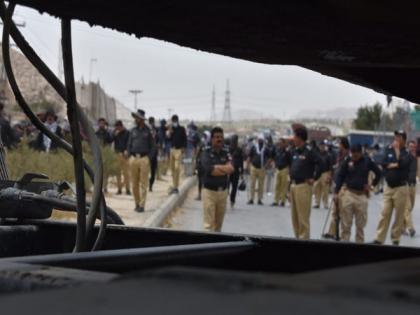Baloch advocacy group accuses Pakistan of reviving 'kill and dump' policy in Balochistan
By ANI | Updated: May 15, 2025 22:37 IST2025-05-15T22:30:42+5:302025-05-15T22:37:46+5:30
Quetta (Balochistan) [Pakistan], May 15 : The Baloch Yakjehti Committee (BYC), a human rights advocacy group, has accused the ...

Baloch advocacy group accuses Pakistan of reviving 'kill and dump' policy in Balochistan
Quetta (Balochistan) [Pakistan], May 15 : The Baloch Yakjehti Committee (BYC), a human rights advocacy group, has accused the Pakistani state of systematically targeting dissenting voices in Balochistan through enforced disappearances and extrajudicial killings.
https://x.com/BalochYakjehtiC/status/1922949747674874250?t=nUpsmg-2gOGKqvenFzrxVg&s=08
In a recent statement posted on X, the BYC alleged that Islamabad has revived its controversial "kill and dump" policy, marking a sharp escalation in its ongoing crackdown on the region.
The BYC described the campaign as a calculated effort to "silence and erase" Baloch identity and political resistance. According to the group, the policy involves the abduction, torture, and custodial execution of activists, students, and professionals, followed by the dumping of their mutilated bodies in remote areas.
"The modern incarnation of the kill and dump policy began in 2009," the statement reads, citing the extrajudicial killing of three Baloch leaders Waja Ghulam Mohammad, Sher Mohammad, and Lala Munir as the starting point. "Since then, hundreds have met the same fate."
The group said that between 2020 and 2021, Pakistan introduced a "new legal facade" to continue these actions under the guise of counterterrorism. They accused the country's Counter Terrorism Department (CTD) of staging fake encounters to cover up state-led killings, with victims routinely branded as terrorists without due process.
"This manipulation allowed the Pakistani state to whitewash its war crimes before the international community," the BYC claimed.
Recent cases cited include Tariq Baloch, allegedly abducted twice and later found dead in Gwadar, and Sameer Sabzal from Panjgur, both of whom the group says are fresh examples of the ongoing policy.
The BYC termed the actions a violation of international human rights law, the Geneva Conventions, and the Universal Declaration of Human Rights. The statement ended with an appeal to global human rights bodies and media to take notice, warning that silence from the international community enables further abuses.
Balochistan, Pakistan's largest but least developed province, has witnessed decades of unrest driven by demands for greater autonomy, control over natural resources, and allegations of state neglect and military excesses.
Disclaimer: This post has been auto-published from an agency feed without any modifications to the text and has not been reviewed by an editor
Open in app